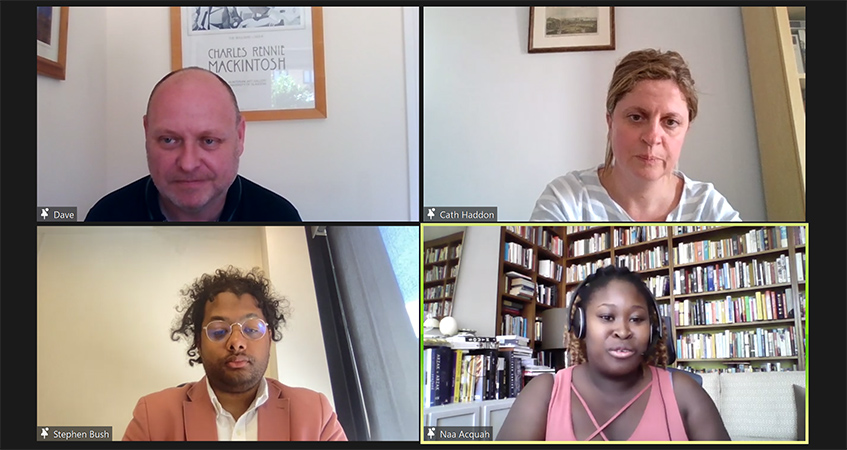Fast Streamers hear from New Statesman’s Stephen Bush and IfG’s Catherine Haddon at exclusive FDA event

The ‘public sector bargain’ refers to an unwritten constitutional agreement between ministers and civil servants which has existed since the Northcote-Trevelyan settlement of 1853. In broad terms, civil servants would accept some restrictions on their political rights and public profile in exchange for a permanent job, while minsters would accept accountability for their departments and the independent, merit-based appointment of civil servants in exchange for a professional and impartial civil service that delivered their political agenda.
The event sought to examine whether this ‘bargain’ has come under strain in recent years. As FDA Fast Stream Co-Convenor Naa Acquah put it, joining the Fast Stream throughout Brexit and COVID-19 has been “quite a whirlwind few years” and not “the typical entering the civil service journey as it might have been ten years ago”.
Asked by Penman if it felt like we were now “in quite different territory”, Haddon acknowledged that “there are particular pressures that are going on at the moment” but stressed that “bad relationships between ministers and civil servants are nothing new”.
“Every government since the Wilson government in ‘64 that I’ve looked at, and probably even in ‘45 also, you can see a government coming in with nervousness about the civil service,” she said. “This belief that they have entrenched views, aligned to the past government.”
While Boris Johnson’s government didn’t take over from another political party, Haddon explained that you see the same elements of this “nervousness” following Brexit, which in many respects was “taken a lot further”. However, despite some very public conflicts between the government and civil servants, such as the “hard rain” Dominic Cummings reportedly said was to fall on Whitehall, Haddon believes “you still get a lot of very good relationships”.
“We talk to private offices and we talk to minsters and there’s still plenty of good relationships going on and plenty of good respect between ministers and civil servants but there are problems,” she explained. “Some of it I think is related to Brexit… civil servants supposedly [were] not fully signed up to it. Actually, a lot of them worked incredibly hard to make Brexit a reality, prepared for no deal time and time again, worked hours beyond what I can even imagine and now have gone on to dealing with COVID, and similarly have just been run ragged by dealing with that and I think a lot of ministers do respect that.”
Bush echoed some of Haddon’s thoughts, and believes that “most of what we’re seeing is just the usual tensions from a change of administration with the weirdness that the change of administration is still a Conservative one”. However, a new “stress factor” distinct to Boris Johnson, according to Bush, is that before his time in Number 10 he ran a devolved institution as Mayor of London. Bush said that this was a more “centralised” model of governance, with City Hall having “a much greater level of bureaucratic support around it than the Prime Minister in Downing Street”. Additionally, Bush argued that throughout his careers in journalism and politics, Johnson has “always needed a deputy editor-style figure”, and “Downing Street and Whitehall more broadly, is not set up to accommodate a Prime Minister” with that governing style.
The recently published Declaration on Government Reform touched upon giving ministers more input on the appointment of officials, but Haddon doesn’t see this becoming a huge shift to a politicisation of the civil service to a US-style model. Haddon thinks that “there are some in and around the Conservative Party who would like to change the model” but she doesn’t think the Prime Minister fundamentally wants to “because he’d get the blame for it”. “I think Boris Johnson would be very nervous if all of the people he appointed he was then held directly accountable for,” she added.
Haddon also recalled the plan for extended ministerial offices under the coalition, which “fell on its face” because “ultimately it wasn’t what ministers wanted in the end”. Bush had quite a sceptical take that “anything that requires this Prime Minister to make hard decisions which involve him personally being held responsible and having to front things up and having to deliver bad news, probably ain’t gonna happen”.
“I think that the likely end state is you just will end up with a degree of ministerial control over Permanent Secretary appointments,” he added. “Which will partly allow them to bring in people from the private sector but I suspect in practice will be a little bit like the Prime Minister getting to pick who the Archbishop of Canterbury is.”
Asked by a member whether special advisers (SpAds) will likely have an expanded role in the future, Haddon replied that she believes Dominic Cummings, the Prime Minister’s former adviser, “is the outlier”. While the data is hard to gather, she said that what she has seen is that SpAds are actually “getting younger and less experienced over the last 20 years or so” and she thinks there is scope to “use SpAds better” by “recruiting people who are really skilled and experienced… who have worked in government before”. Bush stressed that SpAds are “really important to the functioning of effective government” and agreed with Haddon that “part of getting more out of SpAds is hiring them better and hiring them for specific purposes”.
Related News
-

Organising: a community of practice
FDA Head of Organising and Learning Deri Bevan on the rise in HEO, SEO and graduate scheme members who are increasingly active within the FDA. Plus, trends and feedback from this year’s FDA Learn calendar.
-

Retention and reward for the Fast Stream
Robert Eagleton, the FDA’s National Officer for the Fast Stream, outlines why retention and pay parity are the key issues for Fast Streamers.
-

FDA highly commended for Funding the Nation campaign at 2025 TUC Comms Awards
The FDA is delighted to have been highly commended in the Best Campaign Communication category for ‘Funding the Nation’ at this year’s TUC Comms Awards.